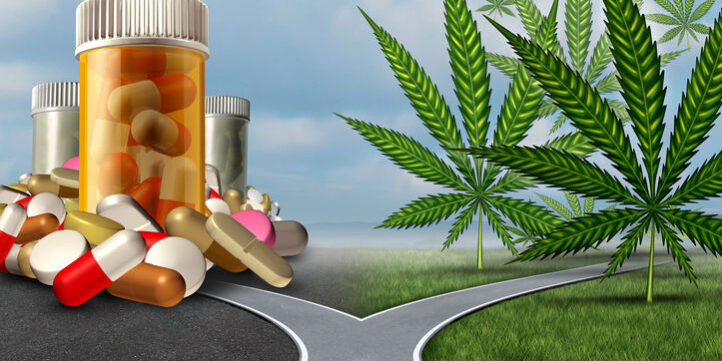Everywhere you turn, you’re seeing ads, commercials, signs and natural health providers touting the benefits of CBD oils, which a derivative of Cannabis plant. There is much confusion of the differences between CBD, THC, and medical marijuana, even sometimes in the court system, which is instituting new laws and regulations to catch up with the booming industry. (See Shauna’s Law in Kentucky and the 2018 Farm Bill).
“Right now, CBD is the chemical equivalent to Bitcoin in 2016,” said Jason DeLand, a New York advertising executive and a board member of Dosist, a cannabis company. “It’s hot, everywhere and yet almost nobody understands it.”
So it is our hope that we can first, clarify the differences first between CBD and THC; second consider it’s affect on our patient’s sleep, and third, consider some recent studies.. Research studies are just beginning on the various cannabinoids or compounds of Cannabis, but some evidence suggests that they can have a significant effect on the sleep-wake cycle.
What is Cannabis?
“Cannabis, also known as marijuana among other names, is a psychoactive drug from the Cannabis plant used for medical or recreational purposes. The main psychoactive part of cannabis is tetrahydrocannabinol (THC), one of 483 known compounds in the plant, including at least 90 other cannabinoids. Cannabis can be used by smoking, vaporizing, within food, or as an extract.” – Wikipedia
There are more than 90 cannabinoids in the cannabis plant. Studies are currently being conducted to determine if they improve sleep, and/or improve certain conditions such as depression, anxiety, Alzheimer’s and Parkinson’s diseases, seizure disorders, and/or chronic pain. Tetrahydrocannabinol (THC) and cannabidiol (CBD) are the two primary cannabinoids that occur naturally in the Cannabis sativa plant, (most commonly known as cannabis).
What is the difference between THC and CBD?

PSYCHOACTIVE vs. NON-PSYCHOACTIVE
- CBD is a non-psychoactive, which means it does not cause the feeling of being ‘high’, as it does not bind CB1 or CB2 nerve receptors in the brain. Thus, CBD will not make you feel intoxicated or compromise mental clarity. CBD is non-toxic, nearly side-effect free, and offers a natural alternative to various symptoms.
- THC is the main psychoactive component of the cannabis plant and creates the feeling of being ‘high’ or intoxicated. THC binds tightly to the CB1 and CB2 nerve receptors in the brain and throughout the body. THC mimics effects on anandamide and 2-AG neurotransmitters which causes relaxation, altered senses, fatigue, hunger and reduced aggression.
SOURCE
- CBD can be derived from both the industrial hemp plant (male cannabis crop) and the female marijuana plant. The hemp plant does not have resinous, cannabinoid-packed flowers, but the rest of this crop does contain some cannabidiol among the stalk, leaves and more. CBD is the second most abundant compound in hemp, typically representing up to 40% of its extracts.
- THC is only present in the female cannabis plant, because this is the one that produces those resinous flowers that are able to provide the high that so many marijuana consumers desire. THC only comes from very specific portions of the female cannabis plant, or marijuana crop. It is present primarily on the resinous flowers of the plant, mostly the sugar leaves, colas, buds, calyxes/bracts and trichomes.
LEGALITY
- Congress federally legalized hemp with the December 12, 2018 passage of the the 2018 Farm Bill, which removes hemp from the Controlled Substances Act and allows farmers to pursue federal hemp cultivation permits, while individual states can regulate the industry within their borders as they see fit.
- CBD is legal in all 50 states, depending on various stipulations. First, if the CBD was derived from hemp or from marijuana. If we’re talking about hemp-derived CBD, then the answer is yes to legality.
- In some states, marijuana-derived CBD and THC is completely legal, while in others, they are completely illegal, but in most states, its a bit of a mixed bag, each state having CBD-specific and THC-specific laws. You must research your state’s current legislation to determine legality.
- Find our more about legality in your state: Legality by State
How does Cannabis affect sleep?
Research demonstrates that cannabis has relaxing and sedative effects and makes falling asleep easier. It relaxes the body, decreases the time it takes to get to sleep, and lengthens time spent in slow wave sleep. Studies also show that THC in cannabis appears to shorten time spent in REM sleep.
The following are major components in cannabis that may affect sleep:
- Cannabinoids
- Cannabidiol (CBD – a cannabinoid that promotes relaxation).
- Cannabinol (CBN – a cannabinoid that has significant sedative effects)
- Tetrahydrocannabinol (THC – the most commonly known component in cannabis that is known to reduce pain and nausea. There is also new evidence that THC may improve breathing during sleep – a significant benefit in ODA.
- Terpenes (aromatic molecules in cannabis that create its smell and taste)
- Myrcene – a chemical substance with some anti-inflammatory and sedative effects.
- Caryophyllene – this substance may also relieve stress, anxiety and possess some pain-relieving properties.
- Limonene – another ingredient in cannabis that may reduce insomnia symptoms.
- Terpineol – studies show that terpineol has relaxing, pain-relieving, and sedative effects.
- Linalool – This has been shown to reduce symptoms of anxiety and depression and assist in falling asleep more rapidly.
While different types of cannabis plants possess different types and amounts of cannabinoids and terpenes, there is significant evidence that there is a positive effect on sleep – but research has not completely concluded on the benefits versus the potential pitfalls when using this expensive and illegal (in some states) drug.
Recent Sleep Studies and Cannabinoids
A 2006 sleep study, “Cannabidiol, a constituent of Cannabis sativa, modulates sleep in rats”, concluded that CBD might actually hold therapeutic promise for those with somnolence, or excessive daytime sleepiness from a not-so-good night’s rest.
A 2013 study, tested the effects of varying doses of CBD in rats and the effects of sleep. Their conclusion, “The systemic acute administration of CBD appears to increase total sleep time, in addition to increasing sleep latency in the light period of the day of administration.”
A January 2019 study, for example, suggests CBD might help people with short-term sleep problems. From that study: “Sleep scores improved within the first month in 48 patients (66.7%) but fluctuated over time. In this chart review, CBD was well tolerated in all but 3 patients.”
Statistics concerning CBD usage and effectiveness
“According to a new estimate from cannabis industry analysts, the Brightfield Group, the hemp-CBD market alone could hit $22 billion by 2022. So far the CBD industry is on track to hit $591 million in 2018, and thanks to a number of factors — including, surprisingly, Senate Majority Leader Mitch McConnell — that could increase 40 times in the next four years.” – RollingStone.com, September 2018
“42% of the CBD users said they had stopped using traditional medications like Tylenol pain relievers or prescription drugs like Vicodin and had switched to using cannabis instead. 80% said that they found the products to be ‘very or extremely effective.’ Only 3% or less found the product to be either ineffectual or only slightly effective.” – Brightfield Group study
“45.6% of seniors who used CBD said it improved their sleep quality.” (Remedy Review, 2018)
“100% of patients who experienced headaches and migraines reported a decrease in pain and discomfort when using CBD.” (Care by Design, 2015)
“30% of people over age 54 reported CBD reduced their anxiety.” (Remedy Review, 2018)
“CBD is commonly used to address anxiety, and for patients who suffer through the misery of insomnia, studies suggest that CBD may help with both falling asleep and staying asleep.” –Harvard Health Publishing
Conclusion
While the CBD craze is currently reaching a crescendo where you can purchase anything from CBD infused oils, creams, candies, dog treats, to bath bombs. Adding to this craze, some scientists claim that CBD oil can alleviate symptoms from depression, anxiety, intestinal issues, high blood pressure, arthritis, fibromyalgia, migraines, PTSD, autism and many other conditions that may stem from a Clinical Endocannabinoid Deficiency. Research is still pending to back up many of these claims. Using CBD and THC (if legal in your state) is obviously a personal decision, one you should weigh carefully and consult your doctor or healthcare professional about potential interactions or other possible complications before using any product.








